
Brief Update No 24/009 Date: 20 – Nov – 2024
STATEMENT
This document has been approved for distribution by Sea Guardian S.G. Ltd / Operations Department. The provided Intel and information derive from open sources, the Joint Maritime Information Center (JMIC) and United Kingdom Maritime Trade Operations (UKMTO) respective WebPages and products. All rights reserved. No part of this Risk Assessment may be reproduced in any form: electronic, mechanical, or other means without written permission by Sea Guardian S.G. Ltd. Under no Circumstances can Sea Guardian S.G. Ltd be held responsible for any loss or damage caused by a reader’s reliance on information obtained by this Assessment.
Objectives
The purpose of this brief is to provide the Maritime Industry and the Security Stakeholders with:
- Major maritime security incident summary and analysis for the time period 14 – 20 Nov 2024
- Threat assessment updates concerning military operations – terrorism – piracy and also cargo theft, smuggling, stowaways
- Overview of risk assessment and relevant information, in order to support operational planning and decision making.
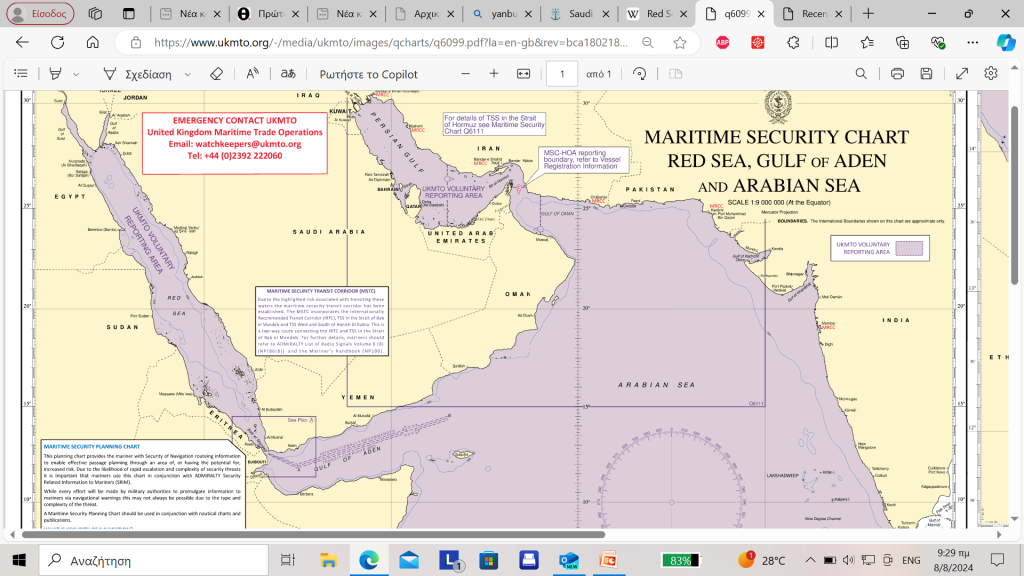
RECENT KEY DEVELOPMENTS
- On Nov 13, the Israeli newspaper “Maariv” reported that the second stage of the ground operation in Lebanon has already begun by the forces of the Israeli army, aiming to destroy Hezbollah’s missile potential even inside Beirut and also to put additional pressure on it.
- On Nov 15, in accordance to the Washington Post, Israel is moving quickly to reach a ceasefire agreement in Lebanon, seeking to deliver an early diplomatic victory to Donald Trump as he prepares to assume the U.S. presidency. In response to this a Hezbollah spokesman said the group was open to a temporary ceasefire, provided Israel did not carry out military operations on Lebanese soil.

- On Nov 16, two Lebanese government officials stated to reporters from France that Lebanon is considering a U.S. ceasefire proposal nearly two months after the start of the war between the Israeli army and Hezbollah.
- On Nov 17, in accordance to New York Times sources, Iranian Supreme Leader Ali Khomeini is reportedly seriously ill, with his second eldest son, Mojtaba Khomeini, likely to succeed him when he dies.
- On Nov 18, the Israeli Prime Minister Benjamin Netanyahu said Israel’s attack on Iran last month degraded its defense and missile capabilities and confirmed reports that nuclear facilities had been hit. This target was an active top secret nuclear weapons research facility in Parchin, near Tehran.

- On Nov 20, the United States vetoed a U.N. Security Council resolution calling for a ceasefire in Israel’s war in the Gaza Strip, accusing council members of cynically rejecting attempts to reach a compromise. The 15-member Security Council voted on a draft resolution proposed by the Council’s 10 non-permanent members at a meeting calling for an “immediate, unconditional and permanent ceasefire” and separately “the immediate and unconditional release of all hostages.”
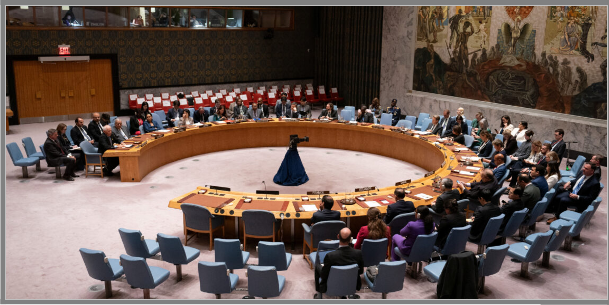
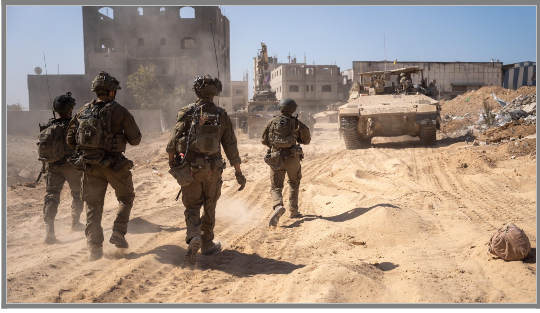
- On Nov 20, after International Atomic Energy Agency (IAEA) chief Rafael Grossi visited the country, the Iranian Foreign Minister Abbas Aragchi stated to the Iranian State television that “There is still an opportunity for diplomacy, even if this opportunity is not very great, there is limited possibility,”.
- On Nov 20, the head of Lebanon’s Hezbollah, Naim Qassem, stated that his group would target the center of Tel Aviv in response to recent Israeli air strikes on Beirut, one of which killed the organization’s media chief spokesman on Sunday.
- According to a UN Panel of Experts released report early November 2024, there are rumors not verified, that the Houthis are collecting money using the HAWALA network from shipping companies via local agencies, to allow ships’ safe transit through the Red Sea.
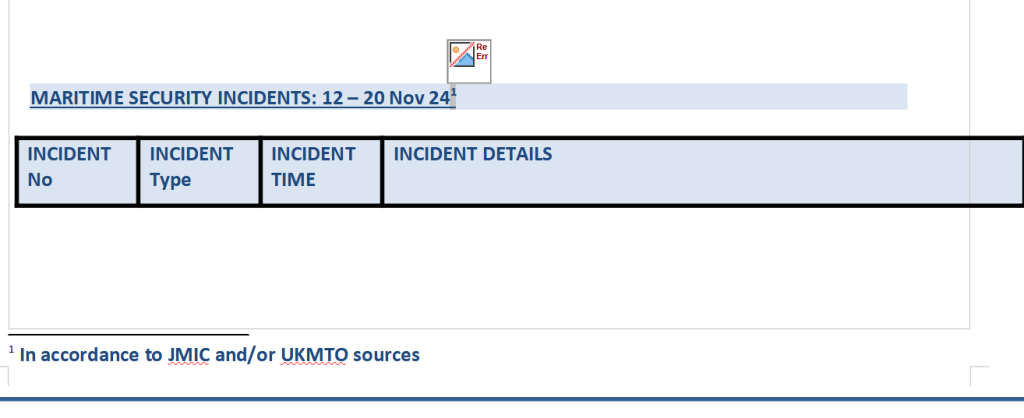
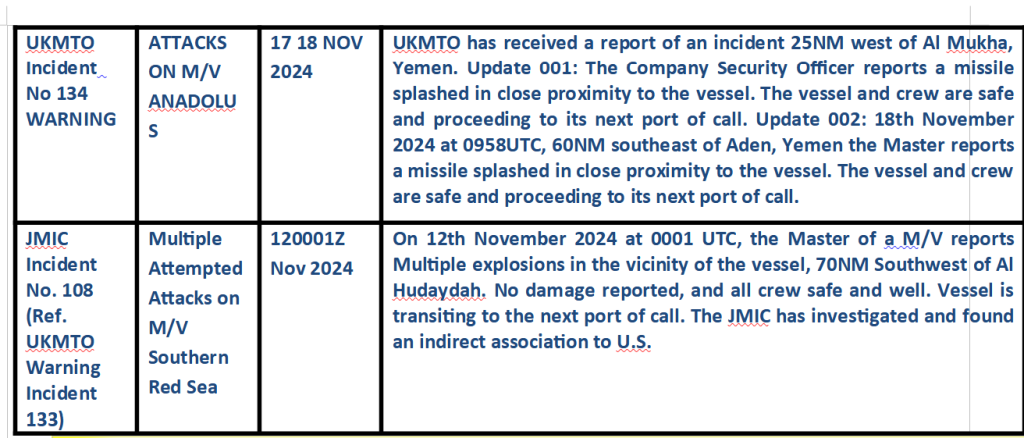
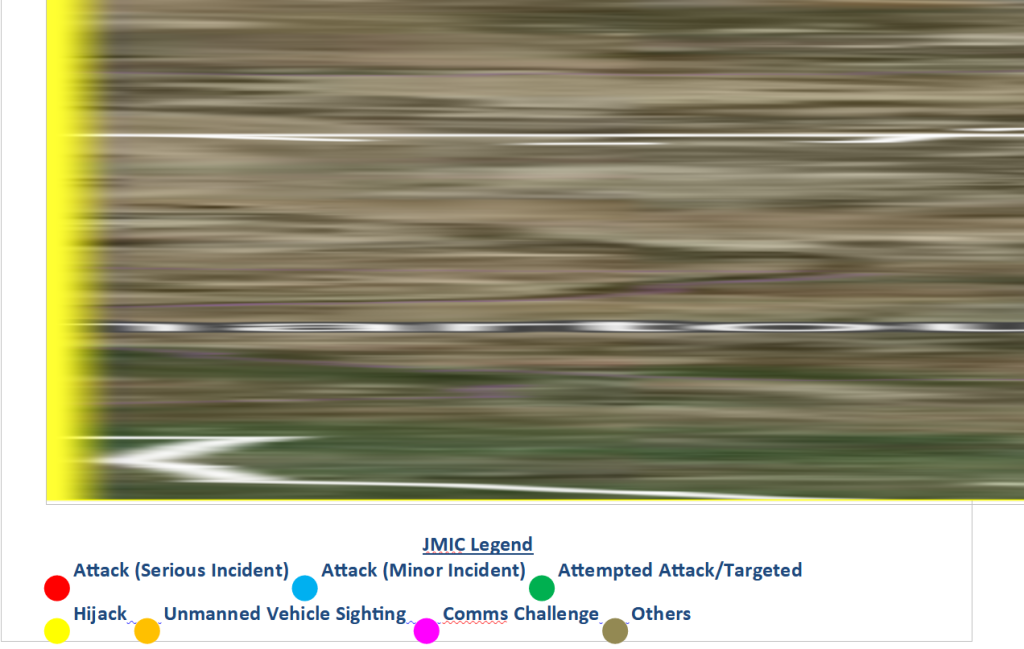
THREAT ASSESSMENT UPDATE:
Military operations – terrorism – piracy and also cargo theft, smuggling, stowaways
Military Operations
NTR
Terrorism – piracy and also cargo theft, smuggling, stowaways
NTR
RISK ASSESSMENT
- The risk of attacks or incidents in the East Mediterranean Sea and Northern Red Sea for the time being is assessed Low with the exception of all Israeli ports. Any port call should be arranged after a direct contact with the Israeli authorities.
- The Bab-el-Mandeb Strait, the southernmost part of the Rea Sea and the eastern part of the Gulf of Aden are still assessed to be the most hazardous areas, with one significant incident occurring during last period against USN ships.
- The pattern of the recent Houthi attacks indicates that their latest strategy favors the conduct of multiple attacks by ASBM, UAVs and cruise missiles.
- It is assessed that Houthi rebels have figured out a way to monetize their blockade of the Red Sea for “safe passage” and that this new “economic endeavor” will fuel further terrorist activity and acts of piracy in the region. In addition, it will also give the group a financial incentive to continue its attacks, no matter what happens in Gaza and Lebanon.
- It is assessed that Greek-owned ships in the Southern Red Sea and Gulf of Oman are at greatest risk of attack by the Houthis and are some of the most frequent targets amongst vessels from Western countries.
- As targets of opportunity for the Houthis diminish due to the decrease of Marine Traffic through the Bab-el-Mandeb Strait, it is assessed that vessels with multiple layers of indirect associations to Israel will be targeted ever more frequently. Maritime industry stakeholders should take into account such associations when conducting threat and risk assessments.
- There are no signs indicating that the Straits of Hormuz are about to be blocked by Iran.
- It is assessed that the Israeli government for the time being and until January 2025, when the new US President assumes duties, will avoid further escalation with Iran and will even promote the idea of a cease fire in Gaza, if the Israeli hostages are released. However, this does not exclude the possibility of a new and more far-reaching attack against Iran and its’ proxies in case of another Iranian attack, especially now that the Israeli prime minister feels confident that Trump will not try to restrain him, if not to openly support him.
- Taking into account the November 6th result of the US elections, it is assessed that both Iran and Israel will keep a moderate stance against each other, waiting to identify the potential new policy of Trumps’ administration by the end of January 2025.
- The current situation around the seas of the Arabic Peninsula will continue the months to come to create risk for the shipping industry and will deter vessels to cross the Red Sea and the Suez Canal. It is assessed that the situation will not improve significantly, at least till summer of 2025.
Sea Guardian S.G. Ltd / Intel Department (www.sguardian.com / +30 6944373465) can support your operational planning, assist in determining the risk assessment and provide assistance in decision making by producing tailored made assessments upon request on ports in the region, on routes, on cargos and specific merchant vessels.
You can refer to our Threat & Risk assessment analysis brief No 24/001//10 Sep 24 for more information and background analysis on the events and situation in the region.
Viewers can also see last week’s report: https://allaboutshipping.co.uk/2024/11/15/sea-guardian-threat-risk-assessment-06-13-nov-2024/





